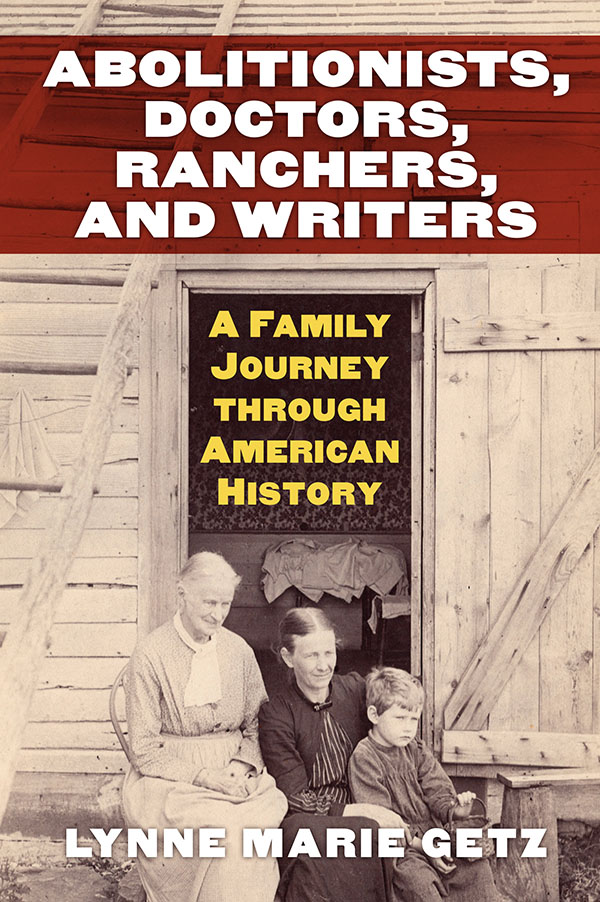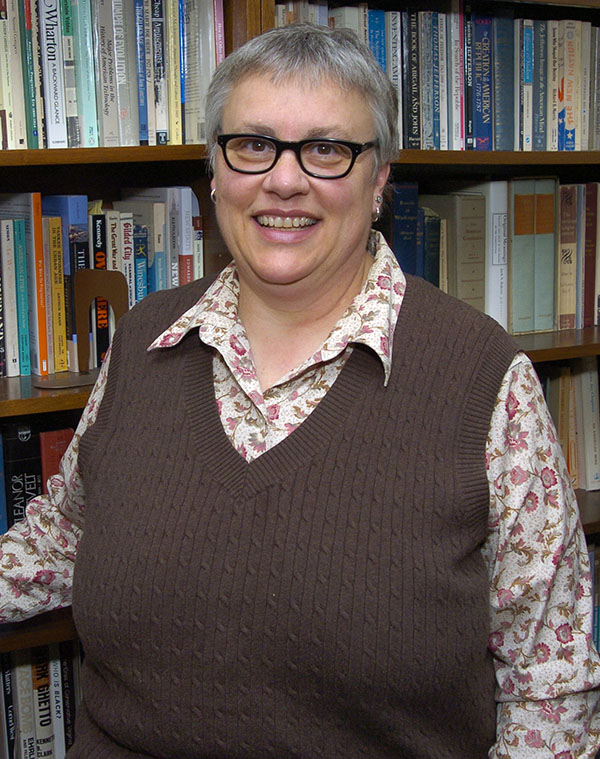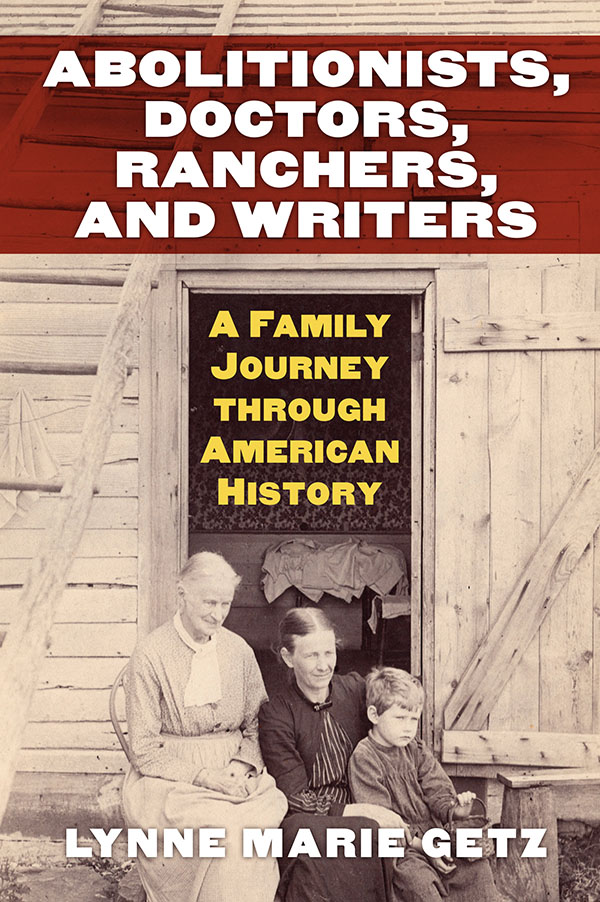
“Abolitionists, Doctors, Ranchers, and Writers: A Family Journey through American History,” in which Appalachian historian Dr. Lynne Getz traces the lives of three generations of the Faunce family though the family’s letter correspondence, is the winner of the Western Association of Women Historians’ Barbara “Penny” Kanner Prize. University Press of Kansas image
Dr. Lynne M. Getz
Professor of history
Department of History
Barbara “Penny” Kanner Prize
Western Association of Women Historians
“I am very pleased to have received the Barbara ‘Penny’ Kanner Prize because, first, it is an award for the best use of primary source documents, and the book was based on family letters that were just amazing.”
Dr. Lynne Getz, professor of history
BOONE, N.C. — The Western Association of Women Historians (WAWH) has awarded Appalachian State University historian Dr. Lynne Getz its Barbara “Penny” Kanner Prize for her book “Abolitionists, Doctors, Ranchers, and Writers: A Family Journey through American History” (University Press of Kansas, September 2017). As part of the award, Getz, a professor in Appalachian’s Department of History, will receive a $500 prize.
The prize, according to the WAWH, “honors a book, book chapter, article or electronic media that has been verifiably published or posted in the two years prior to the award year, and which illustrates the use of a specific set of primary sources (diaries, letters, interviews, etc.).”
“I am very pleased to have received the Barbara ‘Penny’ Kanner Prize,” Getz said, “because, first, it is an award for the best use of primary source documents, and the book was based on family letters that were just amazing.
“I had letters from these families showing everything they did for over three generations, to and from correspondents such as Sarah Grimke and John Brown, among others. Much of the story was told in their own words through these letters, and as a historian, that was an exciting and fun way to write the book.”
From the publisher’s website: “Nearly 250 years after ninety-five-year-old Elder Thomas Faunce got caught up in the mythmaking around Plymouth Rock, his great-great-great-great-great-granddaughter, Hilda Faunce Wetherill, died in Pacific Grove, California, leaving behind a cache of letters and family papers.
The remarkable story they told prompted historian Lynne M. Getz to search out related collections and archives — and, from these, to assemble a family chronology documenting three generations of American life.”
In the award committee’s letter notifying Getz of her receipt of the award, the committee said, “Through the lens of extensively documented family chronicles, you told a compelling story in lively, engaging prose, which widened into an exploration of major events and trends in American history.”
“Abolitionists, Doctors, Ranchers, and Writers” is available from the University Press of Kansas in paperback and hardback formats and is offered through Amazon in e-book, hardback and paperback formats. Additionally, the book is available through Appalachian’s Belk Library and Information Commons.
About Dr. Lynne M. Getz
Getz earned her Ph.D. from the University of Washington, Seattle. She holds an M.A. in history from Texas Christian University and a B.A. in history and Spanish from Adams State College.
She currently teaches courses pertaining to U.S. History, the American West, race and gender, family history and Mexican-American history.
In addition to “Abolitionists, Doctors, Ranchers, and Writers,” Getz is the author of “Schools of Their Own: The Education of Hispanos in New Mexico: 1850-1940,” which was published by the University of New Mexico Press in 1997.
When not writing or teaching, Getz is the co-director of the St. Luke’s Community Garden in Boone. Fresh produce grown in the garden is donated to the Hospitality House of Boone, a 24-hour homeless shelter serving seven regional counties, and the Hunger and Health Coalition, which provides food and lifesaving medications for Watauga County residents in need.
About the Barbara “Penny” Kanner Prize
The Barbara “Penny” Kanner Prize is an annual award conferred by the Western Association of Women Historians to honor a book, book chapter, article or electronic media that has been verifiably published or posted in the two years prior to the award year, and which illustrates the use of a specific set of primary sources (diaries, letters, interviews, etc.). Learn more about the award and past recipients at https://www.wawh.org/awards/barbara-penny-kanner-prize.
About the Department of History
The Department of History offers a broad curriculum in local, national, regional and world history at both the undergraduate and graduate levels, which encourages history majors to develop a comprehensive approach to human problems. The study of history is an essential part of a liberal arts education and offers valuable preparation for many careers, such as law, journalism, public history, public service and business, as well as in teaching and the advanced discipline of history. Learn more at https://history.appstate.edu.
About the College of Arts and Sciences
The College of Arts and Sciences (CAS) at Appalachian State University is home to 17 academic departments, two centers and one residential college. These units span the humanities and the social, mathematical and natural sciences. CAS aims to develop a distinctive identity built upon our university's strengths, traditions and locations. The college’s values lie not only in service to the university and local community, but through inspiring, training, educating and sustaining the development of its students as global citizens. More than 6,800 student majors are enrolled in the college. As the college is also largely responsible for implementing App State’s general education curriculum, it is heavily involved in the education of all students at the university, including those pursuing majors in other colleges. Learn more at https://cas.appstate.edu.
About Appalachian State University
As a premier public institution, Appalachian State University prepares students to lead purposeful lives. App State is one of 17 campuses in the University of North Carolina System, with a national reputation for innovative teaching and opening access to a high-quality, cost-effective education. The university enrolls more than 21,000 students, has a low student-to-faculty ratio and offers more than 150 undergraduate and 80 graduate majors at its Boone and Hickory campuses and through App State Online. Learn more at https://www.appstate.edu.
What do you think?
Share your feedback on this story.




![How NCInnovation Is Rethinking Economic Development in North Carolina [faculty featured]](/_images/_posts/2026/02/rethinking-economic-development-600x400.jpg)








